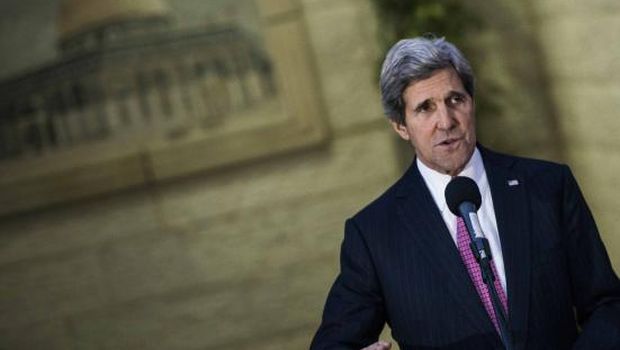
US Secretary of State John Kerry speaks to the media after a meeting with Palestinian negotiator Saeb Erekat and Palestinian President Mahmoud Abbas in the West Bank city of Ramallah in January, 2014 (Reuters/Brendan Smialowski)
London, Asharq Al-Awsat—According to a leaked report published in an Israeli newspaper on Tuesday, an outline Israeli–Palestinian peace agreement being drawn up by US Secretary of State John Kerry will include the recognition of Israel as a “Jewish state.”
The conservative Israeli newspaper Maariv cited an American source as saying Israel will be termed “the nation-state of the Jewish people” in the document. Under Kerry’s peace plan, Israel would exist alongside an independent Palestinian state, which would be the “nation-state of the Palestinian people.”
The development may represent a major gain for the Israeli leadership, which has demanded such recognition as a condition of any peace agreement, but runs the risk of an outright Palestinian rejection of the document.
Kerry’s acceptance of Israel’s demand to be recognized as a Jewish state is a setback to the Palestinians, who claim it would equate to a rejection of the demand for a “right of return” for the 5 million refugees descended from Palestinians who fled what is now Israel in the first Arab–Israeli War in 1948.
“When you talk about a Jewish state, you are talking about the end of any solution for Palestinian refugees,” Nabil Shaath, a senior Palestinian official and former foreign minister, said recently in a media briefing in the West Bank city of Ramallah. “It’s impossible for the Palestinians to sign such an agreement with Israel.”
The document is also reported to propose a peace deal based on Israel’s pre-1967 borders, but with land swaps taking account of “demographic changes” on the ground.
The document is expected to gloss over some contentious issues such as the status of Jerusalem and security arrangements for the Jordan Valley, a strategically sensitive border area of the West Bank where the Israeli government says it wants to station troops in the event of a peace deal.
The Palestinians want East Jerusalem—a sector that includes the biblical city’s holy sites—as their capital. Israeli Prime Minister Benjamin Netanyahu has stated that a Palestinian capital should be situated in an unspecified area termed “Greater Jerusalem,” possibly in the city’s outlying suburbs.
Kerry launched the latest Israeli–Palestinian peace push last July and has visited the region more than 10 times in the past year. He hopes to persuade both sides to sign up to the interim framework agreement currently being put together before April, and then attempt to negotiate a final peace deal by the end of 2014, according to a US official quoted by the Associated Press.
